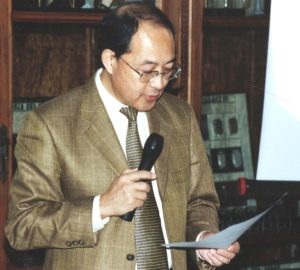 The premier award of the Royal Society of Chemistry, the Faraday Medal and Lectureship, instituted in 1869, is awarded biennially, and the first recipient was the eminent French chemist, Jean-Baptiste Dumas (1800–1884), who was a professor at the École Polytechnique, Paris, before becoming that country’s Minister of Agriculture and Commerce and later Master of the French Mint. In the intervening years other notable recipients include Mendeleev, Niels Bohr, Lords Rayleigh and Rutherford, Hermann von Helmholtz, Sir Cyril Hinshelwood and Sir Robert Robinson. The second Frenchman to earn this accolade (in 2014) was Michel Che, Professor and Director of the Laboratoire de Réactivité de Surface at the Sorbonne Université-CNRS, Paris.
The premier award of the Royal Society of Chemistry, the Faraday Medal and Lectureship, instituted in 1869, is awarded biennially, and the first recipient was the eminent French chemist, Jean-Baptiste Dumas (1800–1884), who was a professor at the École Polytechnique, Paris, before becoming that country’s Minister of Agriculture and Commerce and later Master of the French Mint. In the intervening years other notable recipients include Mendeleev, Niels Bohr, Lords Rayleigh and Rutherford, Hermann von Helmholtz, Sir Cyril Hinshelwood and Sir Robert Robinson. The second Frenchman to earn this accolade (in 2014) was Michel Che, Professor and Director of the Laboratoire de Réactivité de Surface at the Sorbonne Université-CNRS, Paris.
His research covered the reactivity of solid surfaces investigated from a molecular standpoint based on the combined use of transition metal complexes, specific isotopes and physical techniques, notably electron spin resonance. His work, which led to more than 450 publications, a two-volume book (Characterisation of Solid Materials and Heterogeneous Catalysts: From Structure to Surface Reactivity, 2012, Wiley) and 5 patents, has contributed to improve our understanding of the elementary steps that occur at the solid-liquid (gas) interfaces and to bridge the gap between homogeneous and heterogeneous catalyses.
Michel Che was born in Lyon in December 1941. After a chemical engineering degree awarded by the École Supérieure de Chimie Industrielle de Lyon (ESCIL, now CPELyon), he joined the Institut de Recherches sur la Catalyse, CNRS laboratory in Villeurbanne (suburb of Lyon), where he received his doctorate for his work on titania (TiO2).
He then worked with the flamboyant Russian-American colloid chemist, John Tarkevich at Princeton University (1969–71). He also worked at the UK Atomic Energy Research Establishment (1972–1982) before returning to Lyon, and later to Paris, where he became a Professor (1975).
Michel Che was President of the Catalysis Division of the Société Chimique de France and Vice-President of this society (2007–2009). He was President and founder of the highly successful European Federation of Catalysis Societies (EFCATS) 1993–1995, creating the biennial EuropaCat congresses, later he became President of the International Association of Catalysis Societies (IACS) 2000–2004. He received many national awards in France, including the prix-franco-chinois de la SCF-Chinese Chemical Society (2018); in Italy (lauréat du prix de la Società Chimica Italiana (SCI) 2017; in Netherlands (J. H. Van’t Hoff); in Poland (Sklodowska-Curie and P. Curie lectureships); in Germany (Von-Humbold-Gay Lussac award, GDCh-Wittig lectureships); in Japan (Japanese Society for the Promotion of Science lectureship); in China (Gold Medal of the Chinese Academy of Science, Friendship award and International Science and Technology Cooperation Award, 2008); and Europe (François Gault EFCATS lectureship). His works earned him several honorary doctorates and fellowships (Germany Academy of Science Leopoldina; Academia Europaea; Hungarian Academy of Sciences; Polish Academy of Art and Sciences; Honorary Professor of Fuzhou University 2018).
Proud of his Chinese origins – his father emigrated to France as a young engineer – Michel Che was exceptionally popular in the P. R. of China, and was one of the first European scientists to be invited there in 1977. He was Chairman of the Academic Committee of the State Key Laboratory of Catalysis in Dalian (the first state key laboratory in the catalysis field in China) during 2006–2014. As a Chairman of that committee, he facilitated the progress of many young Chinese to promote international collaborations. For his great contributions to the scientific development of China, particularly that between France and China, he was awarded the International Cooperation Award of China presented at the Great Hall of the People by the President of the Republic, the highest honour for foreign scientists.
Michel Che was a member of the Scientific Committee of the Institut Français du Pétrole (IFP, now IFPEN) for more than 30 years. He was a member for many years of a selection committee for newly recruitable scientists at Osaka Prefecture University in Japan, where he was also a Visiting Professor.
His links with the UK were particularly strong. As well as serving, for many years, as Chairman of the External Advisory Board of the Cardiff Catalysis Centre, he was particularly fond of visiting the Davy Faraday Research Laboratory of the Royal Institution of Great Britain, London, where he presented many seminars and interacted with its Director.
Michel Che was a charming, highly cultured and compassionate human being, admired and loved by an enormous family of world-renowned fellow scientists. Discussions with him reminded one of how a first-rate scientist should behave – with great human decency towards others, friends and strangers alike. He was proud of the phenomenal contributions made by French scientists (especially Sabatier) to modern science, and he also rejoiced in the antiquity of China and the expertise of Chinese philosophers throughout the ages. He lived an extraordinary active life. Among the thousands of scientists he encountered throughout the world, he never made an enemy – only friends, who rejoiced being in his company. He died, of pancreatic cancer, in a Paris hospital after a short illness on 7 August 2019.
Michel Che
Born Lyon, 29 December 1941
Married Danielle (née Reynaud) at the City Hall on 7 July 1964 (official) and in the Church on 8 July 1964 (religious).
Four Children: Patrick, Brigitte, Catherine, Didier
Died Paris, 7 August 2019
(Prepared by John Meurig Thomas FRS FREng FRSE)